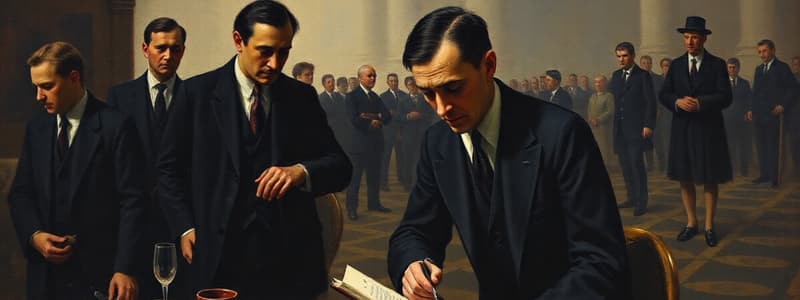Podcast
Questions and Answers
What does the doorkeeper symbolize in Vor dem Gesetz?
What does the doorkeeper symbolize in Vor dem Gesetz?
- The inevitability of fate
- Impenetrable authority (correct)
- The journey of enlightenment
- Open access to knowledge
What theme is primarily highlighted in the quote 'For years, the man sits there and does not get further'?
What theme is primarily highlighted in the quote 'For years, the man sits there and does not get further'?
- Existential frustration (correct)
- The power of resilience
- The importance of patience
- The search for truth
In Der Schlag ans Hoftor, what does the blow symbolize in relation to expectations?
In Der Schlag ans Hoftor, what does the blow symbolize in relation to expectations?
- The unpredictability of outcomes (correct)
- Desire for confrontation
- Unwavering hope
- Anticipated failure
What is the main conflict introduced by the man's initial question, 'Can I enter?' in Vor dem Gesetz?
What is the main conflict introduced by the man's initial question, 'Can I enter?' in Vor dem Gesetz?
How does the closing line of Vor dem Gesetz reflect on the man's journey?
How does the closing line of Vor dem Gesetz reflect on the man's journey?
What does the phrase 'the blow that you expect, and yet it is the one that opens the door' imply about expectations?
What does the phrase 'the blow that you expect, and yet it is the one that opens the door' imply about expectations?
What overarching theme do both Vor dem Gesetz and Der Schlag ans Hoftor share?
What overarching theme do both Vor dem Gesetz and Der Schlag ans Hoftor share?
Which aspect of human experience is primarily depicted through the character's interactions with the doorkeeper?
Which aspect of human experience is primarily depicted through the character's interactions with the doorkeeper?
Flashcards
Kafka's Vor dem Gesetz theme
Kafka's Vor dem Gesetz theme
The inaccessibility of justice and power, and the individual's struggle against bureaucratic obstacles.
Kafka's Vor dem Gesetz parable
Kafka's Vor dem Gesetz parable
A short story about a man trying to enter the law, but encountering a doorkeeper who denies him access.
'Vor dem Gesetz steht ein Türhüter'
'Vor dem Gesetz steht ein Türhüter'
A quote from Vor dem Gesetz meaning 'Before the law stands a doorkeeper'.
'Der Schlag ans Hoftor'
'Der Schlag ans Hoftor'
Signup and view all the flashcards
Paradox in Der Schlag ans Hoftor
Paradox in Der Schlag ans Hoftor
Signup and view all the flashcards
Access to justice in Kafka's works
Access to justice in Kafka's works
Signup and view all the flashcards
Meaning of "Doorkeeper" in Kafka
Meaning of "Doorkeeper" in Kafka
Signup and view all the flashcards
Futility in Kafka's parables
Futility in Kafka's parables
Signup and view all the flashcards
Study Notes
Kafka's Parables: Vor dem Gesetz and Der Schlag ans Hoftor
-
Vor dem Gesetz ("Before the Law"): A parable exploring themes of authority, bureaucracy, and the individual's struggle against inaccessible power.
- Key figure: A doorkeeper who bars access to the law.
- Central conflict: A man's repeated attempts to enter the law, facing continual delays and barriers.
- Symbolic quote: "Before the law stands a doorkeeper." - Highlights the impenetrable authority between the individual and the law.
- Essential theme: The futility of waiting and the elusive nature of the law in an intricate, unyielding bureaucratic system
- Paradoxical ending: "Now the man sees that the gate had been open for him all the time." - Illustrates the missed opportunities present amongst the struggles, highlighting how one’s obsessive focus on the barriers can obstruct access.
-
Der Schlag ans Hoftor ("The Blow at the Court Gate"): A parable focused on the absurdity of communication and authority, characterized by a symbolic blow on a gate.
- Key concept: Expecting a blow that opens the gate; the expected harm leads to resolution.
- Crucial aspect: The act of striking the gate as a means to gaining entry.
- Highlighted theme: The arbitrary nature of authority, where meaning seems unpredictable.
- Philosophical insight: "It is the blow that you expect, and yet it is the one that opens the door." - A paradoxical statement that reflects the contradictory nature of actions that are both expected and unexpected.
- Implication: Every act carries repercussions that are not immediately evident or apparent; the resulting outcome is not always predictable.
-
Shared themes across both parables: Both stories explore the feeling of helplessness in the face of an unyielding system of authority. The individual’s struggle to comprehend and navigate the systems of meaning is central to them both.
Studying That Suits You
Use AI to generate personalized quizzes and flashcards to suit your learning preferences.




